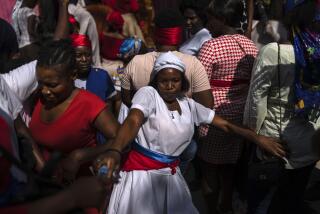As Khmer Rouge guerrillas in the ‘70s, they took part in genocide. Now, as Christians, they ask for forgiveness
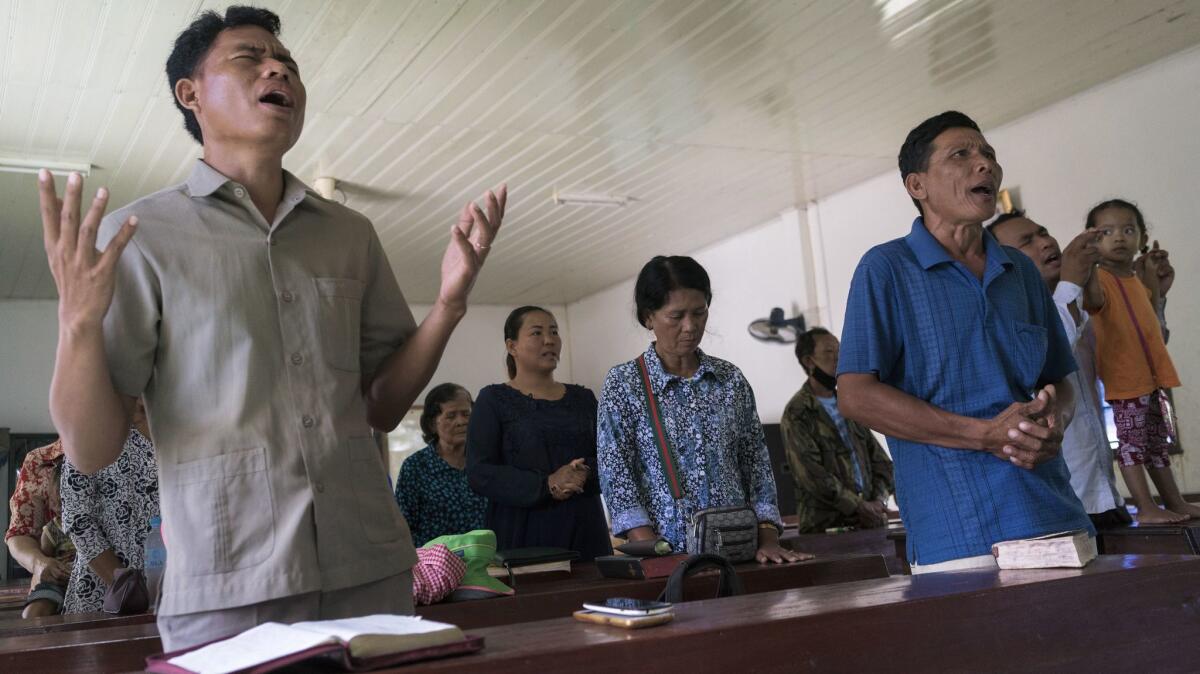
- Share via
Reporting from Pailin Province, Cambodia — Consulting a Bible app on his smartphone, Norng Chhay pulled up his favorite passage from the book of Matthew.
“‘Do not judge others, and you will not be judged. For you will be treated as you treat others,’” the former Khmer Rouge soldier read aloud. Matthew 7 particularly resonates with him, he said, given his past as a member of one of the most notorious armies of modern times.
Recruited by the Khmer Rouge as a 15-year-old, Norng engaged daily in jungle warfare against Vietnam. More crucially, he had a role in the genocide carried out by Pol Pot’s short-lived Communist regime from 1975 to 1979, which left roughly 2 million Cambodians dead from starvation, overwork and mass executions.
“Even though I was not a direct perpetrator or the one who beat people to death, I too participated in it because I was the one who brought them to their deaths,” Norng said. “I used to escort them to the fields, and I have witnessed people being beaten and then thrown into mass graves.”
It was fear for his own safety that forced him to be part of the executions, Norng said. “People today are fast to judge our past actions even though they do not understand what we have gone through.”
The now devout 57-year-old is one of more than 600 Christians living in Pailin, a small western province bordering Thailand. Populated in large measure by Khmer Rouge stalwarts who fled there after their leadership was ousted from power in 1979, these former officers, cadres and supporters have turned to Christianity to seek comfort and salvation.
Yet Cambodians, mistrustful of the sincerity of these conversions, dismiss their newly adopted zeal for religious ideology.
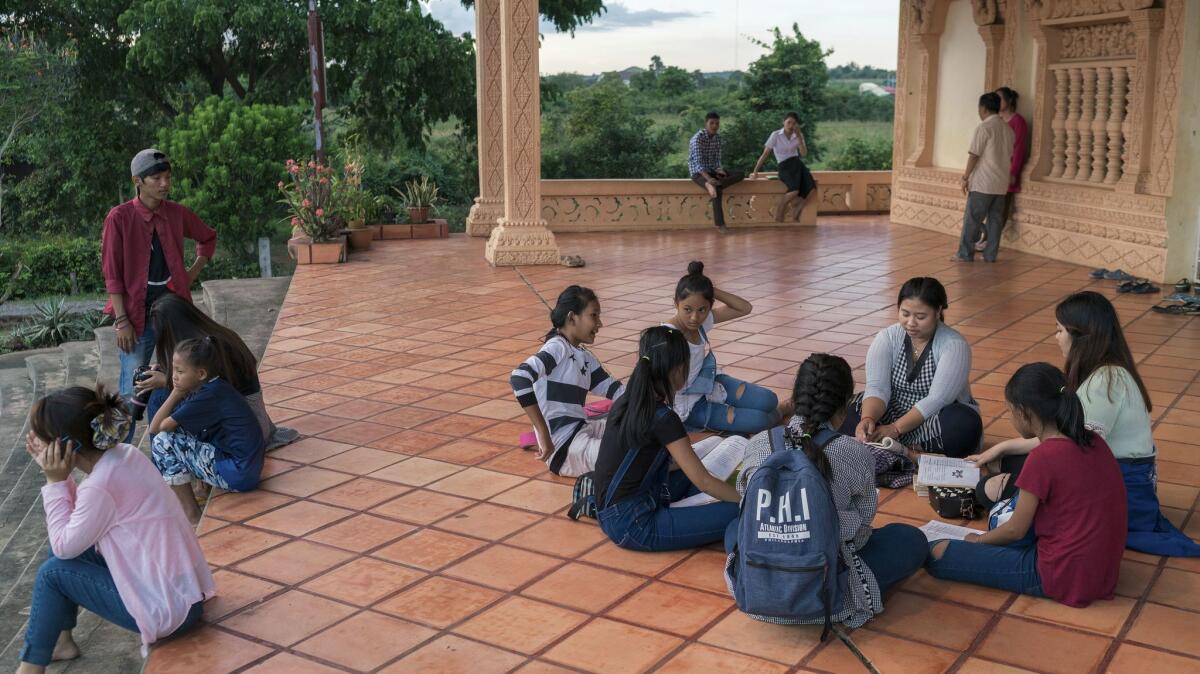
After the fall of Pol Pot’s regime, Khmer Rouge fighters fled westward to the mountainous terrain of Koh Kong province and the dense jungles of Battambang province. They continued waging fierce guerrilla battles against the Vietnamese-backed government until 1996, when a deal was brokered between the two forces: Pailin province, a small area of land carved out of Battambang, was promised to the Khmer Rouge leadership in exchange for reintegrating their supporters and fighters into the government.
During this protracted period of political turmoil, Christian missionaries and religious organizations flooded in to distribute humanitarian aid. Along with their resources came religious ideals, and the missionaries found willing listeners among the ultra-Maoist ideologues, who had long been prohibited from adhering to any sort of faith, said Kong Duong, Pol Pot’s former chief propagandist and head of the Khmer Rouge radio station between 1979 to 1996.
The Khmer Rouge went to great extremes to eliminate religion — going as far as destroying the majority of the country’s temples and pagodas and massacring thousands of monks. They also destroyed churches in the capital city and slaughtered Cambodian Christians, along with Muslims and ethnic Vietnamese, Chinese and indigenous minorities.
“After the Khmer Rouge escaped to the western provinces in 1979, it was not Buddhist monks that came here first,” said Kong, today the director of the provincial information department who also works as a broadcaster for Christian radio programs. “It was through the activity of the Christians going around this area and connecting with Khmer Rouge people — that is perhaps the reason people started liking it and believing in it.”
Today, Pailin’s eponymous capital is a long stretch of road dotted with small businesses and guesthouses leading to the Thai border, flanked by 22 churches of various Christian denominations, from the Roman Catholic order of the Marist Brothers to Presbyterianism and Protestantism.
This is a considerable density for a predominantly Buddhist country, where the entire Christian community makes up only 2% of the population. Exact figures of converts who were former Khmer Rouge cadres are difficult to quantify due to their secrecy about their past to outsiders, but Kong estimated that 40% of his fellow cadres living in Pailin and neighboring Battambang province are now Christians.
Yet an apparent change of faith does not always extend to changing minds, as many former cadres still favor the former regime’s ideology and refuse to acknowledge the responsibility that its senior leaders bear for perpetrating torture and mass killings.
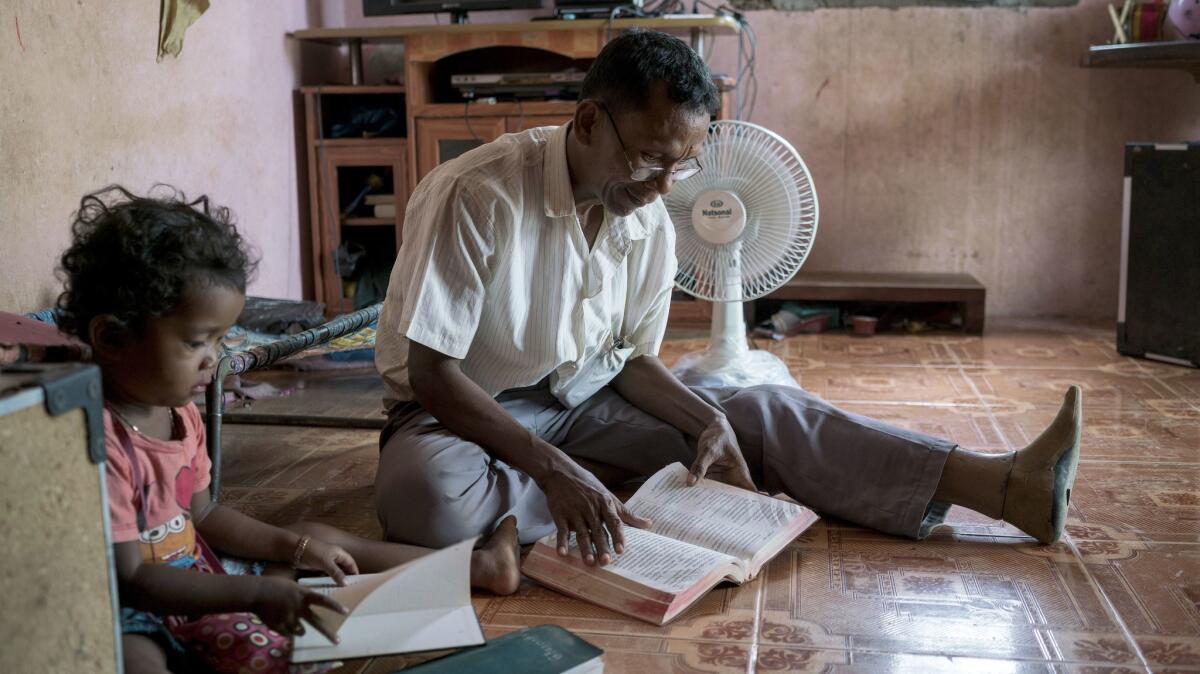
Sok Sem, 58, a former military unit commander up until the Khmer Rouge integrated in 1996, said he did not believe the mass killings occurred.
“I disagree that the regime was cruel. I think Pol Pot was a good person,” said Sok, who was baptized in 2001. “The people I killed and that I saw were dead were on the battlefield. They were all soldiers. I have never witnessed killings within the country by the Khmer Rouge.”
The wholesale denial of a nationwide atrocity is one of the reasons that many Cambodians are skeptical about the religious motives of former cadres, especially as the inner workings of the Khmer Rouge are slowly being revealed in a U.N. war crimes tribunal that is trying the regime’s most senior leaders.
Perhaps the most notorious cadre-turned-Christian is Kaing Guek Eav, better known by his alias Duch, who oversaw the torture and execution of some 20,000 Cambodians at the notorious Tuol Sleng prison camp. Sentenced to life in prison by the tribunal, Duch was baptized shortly after his wife died in 1995.
By the time he was called to stand trial in 2009, he had built a Protestant church in his home village and converted dozens of families, according to “When Clouds Fell From the Sky: A Disappearance, a Daughter’s Search and Cambodia’s First War Criminal,” a book published last year on the devastating impact the regime had on a single French-Khmer family.
While many Cambodians do not believe Duch’s conversion to be genuine, author Robert Carmichael said the psychological profile conducted by the tribunal doctors showed that the former schoolteacher was drawn to Christianity in the same way he was drawn to the communist beliefs espoused by the Khmer Rouge — by whichever ideology he considered to be the strongest force.
“I do think that he sees himself as a Christian, though of course his lack of empathy towards his victims (which we saw at trial) and his 180-degree turn from effectively pleading guilty to not guilty on the last day of his 2009 trial means he clearly doesn’t understand one of Christianity’s most basic concepts,” Carmichael said in an email.
Youk Chhang, executive director of Documentation Center of Cambodia, which compiles research related to the regime, was even less forgiving.
“Duch was trying to fool God,” Youk, a Khmer Rouge survivor, said. “The Khmer Rouge came to God not because they have faith, but ... as a means to get out of the past.”
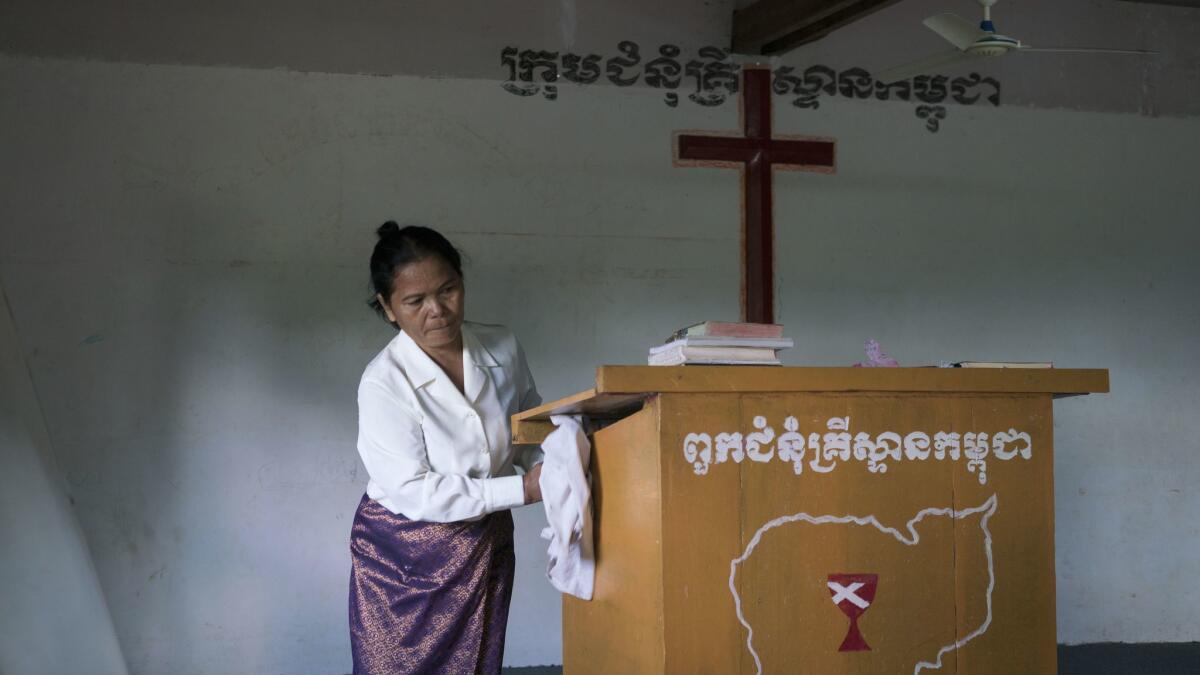
For 75-year-old Morm Phin, life after the regime has been a long trek toward forgiveness. In the beginning of the Khmer Rouge’s reign, she worked as a technical supervisor at a weaving factory that produced clothing for the black-clad cadres.
Then in 1978, she was transferred to work as a medic in a hospital, an experience that transformed her once favorable view of the regime. Next door to the clinic was a detention center where prisoners were shackled, tortured and starved to death, she said.
Morm also witnessed that year the death of her cousin, who was beaten brutally onstage in front of thousands of people. Along with seven other people, he was publicly punished for committing “immoral acts,” she said.
Before the eight people were beaten to death, the black-clad cadres asked the crowd if they should be executed or allowed to live. “If we agreed that they should live, we should raise our hands. But nobody raised their hands because we were all afraid,” Morm recounted. “Even though it was my own blood relative, I did not raise my hand.”
Today, the Christian pastor — who runs a small church in her modest home, surrounded by fruit and vegetable crops — said she believes in practicing forgiveness toward Duch and the other leaders on trial at the tribunal.
“The Bible taught me that I need to learn to forgive, and that is also why God has forgiven me for my sins,” Morm said. “I don’t think I am a perfect person in my past, but I believe that one day, I could be with God when I pass away.”
Chen is a special correspondent. Special correspondent Kuch Naren contributed to this report.
ALSO
Dissident Chinese artist Ai Weiwei finds home too dangerous, but he may go to Syria
From Vietnam to Los Angeles: Photographer who captured iconic image on one road sees end of another
More to Read
Sign up for Essential California
The most important California stories and recommendations in your inbox every morning.
You may occasionally receive promotional content from the Los Angeles Times.

